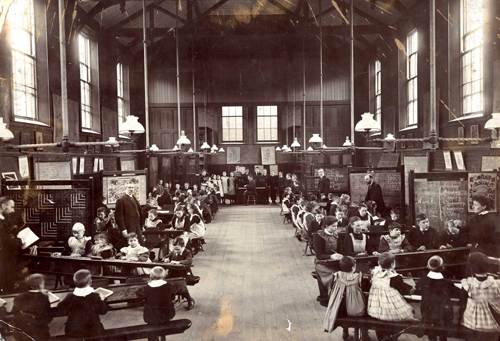Irish schools are a danger to Irish children, INTO Congress is told
Dublin, 7 April 1923 - Poor attendance and facilities were among the big issues raised at the annual Congress of the Irish National Teachers Organisation (INTO), which was held at the Mansion House in Dublin yesterday.
Irregular attendance was, the Congress was told, a major blot on the reputation of the Irish schooling system. In a paper delivered to the Congress yesterday on the linked issues of ‘School Attendance and School Accommodation’ Mr. J. Boyce, chairman of the Belfast branch of the INTO, said that to ‘produce an attendance with the minimum of compulsion the school must, in a living and complete way, become a part of the social, the economic, and the recreational life of the community.’ Mr Boyce gave examples of the social and economic opportunities that are closed off by poor school attendance. In charge of the entrance examinations for a Belfast Technical College, he noted that in one year 600 young people had been refused admission because they had not received a sixth-class education. All of them, he said, had been irregular attenders.
Mr. Boyce also made the point that many Irish schools were essentially useless for educational purposes, owing to their poor condition. In Belfast alone, he said, there were 81 unsuitable schools where 12,000 pupils were being ‘slowly poisoned daily with foetid air’ their lives endangered from the insanitary school buildings.
The Congress had already heard that a large proportion of the children attending Irish national school were suffering from preventable and remediable diseases. It was in this context that Sir James Craig TD called for the medical inspection of children in schools and the establishment, as soon as possible, of full-time medical officers of health in the Free State. Sound teaching and continuous practice in the principles of hygiene was essential, he said, to improving the health of children. He added, however, that there are seven essential factors in ensuring the physical well-being of children: proper food; fresh air; warmth; cleanliness; rest and regular habits. An eighth, he suggested, would be happiness.
Meanwhile, in recognition of the new political realities on the island, the Congress has voted to open a northern office in Belfast and to employ both an office secretary and a full-time union organiser for the northern area. Moving the motion to establish a distinct northern presence, Mr. John Harbison from Belfast said that while he was opposed to partition he had to face the facts as they were and, as there was a rival organisation in the north, it was vital to counteract it and keep INTO alive, which united all creeds and classes in the whole country. Mr. Harbinson added that he hoped to live to see a united country and teachers had a lot of power to help bring that about.
The INTO’s relationship with the Labour Party was also up for discussion, although a motion from Carrickmacross delegates to ascertain whether a levy for a political election fund to support candidates was limited to the Labour Party was withdrawn.
The Carickmacross delegate, Mr. Taylor, said that while he was in favour of teachers entering active politics, he believed they should do so as an independent party. However, Senator Cummins from Kildare countered that before they had the Labour Party at their back and supporting them, teachers had been slaves running to all classes of government looking to have their concerns addressed. Senator Cummins said that he hoped that with the support of teachers, Labour’s representation in the next Dáil would be double or triple what it is now.
[Editor's note: This is an article from Century Ireland, a fortnightly online newspaper, written from the perspective of a journalist 100 years ago, based on news reports of the time.]





















